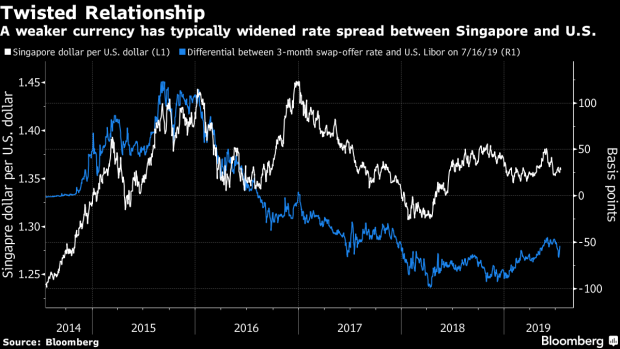(Bloomberg) -- A rapid deterioration in Singapore’s economic data has fueled speculation the central bank will ease monetary policy. The result may be higher interest rates and bond yields.
Bets the Monetary Authority of Singapore will adjust policy have intensified after government reports over the past month showed the economy unexpectedly shrank 3.4% in the second quarter and exports slumped 17.3% in June. The trade-reliant economy has suffered amid escalating tensions between the U.S. and China.
The data caused a jump in the three-month swap-offer rate, one of the nation’s benchmark interest rates that reflects the cost of borrowing in Singapore dollars. The gauge rose for four days after the GDP data even as borrowing costs in the rest of the world fell. The rate had previously surged in January 2015 when the MAS eased policy, and again in April 2016 when it stopped seeking currency appreciation.
The counter-intuitive relationship between monetary policy and borrowing costs is due to how Singapore’s central bank seeks to guide the economy. Instead of using interest rates to adjust liquidity, MAS does so through adjusting the currency against an undisclosed basket.
In the absence of central bank control, interest rates are typically dependent on those overseas, particularly in the U.S. They also move based on expectations for whether the local currency is expected to strengthen or weaken.
“We are now looking for the MAS to ease policy in October” due to deteriorating growth and slowing inflation, said Irene Cheung, a senior Asia strategist at Australia & New Zealand Banking Group Ltd. in Singapore. “Given easing in currency policy, Singapore rates will likely be supported even though lower U.S. rates will exert downward pressure.”
Any weakness in inflation numbers due this week may add to easing bets. Core inflation probably slowed to 1.2% last month, which would be least since March 2017, according to a Bloomberg survey before the data is released Tuesday. The gauge has dropped from as high as 1.9% in December amid stuttering local growth and the U.S.-China trade war.
Whereas most central banks review policy eight to 12 times a year, MAS only does so twice: in April and October. Given the rapidly worsening economic environment, ING Groep NV says local policy makers may feel compelled to make an unscheduled adjustment.
“Talk of an off-cycle policy adjustment, before the next scheduled semi-annual review in October, has gained traction,” Prakash Sakpal, an economist at ING, wrote last week in a research note. “We continue to expect easing either this month or next.”
Below are key Asian economic data and events due this week:
To contact the reporter on this story: Masaki Kondo in Tokyo at mkondo3@bloomberg.net
To contact the editors responsible for this story: Tan Hwee Ann at hatan@bloomberg.net, Nicholas Reynolds, Nasreen Seria
©2019 Bloomberg L.P.








